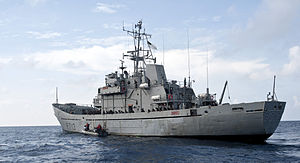BNS Gomati
 Sister ship BNS Sangu
| |
| History | |
|---|---|
| Name | BNS Gomati |
| Builder | Hall, Russell & Company, Aberdeen |
| Yard number | 983 |
| Laid down | 6 February 1978 |
| Launched | 18 October 1978 |
| Acquired | 12 September 2003 |
| Commissioned | 3 October 2004 |
| Homeport | Khulna |
| Identification | Pennant number: P 914 |
| Status | in active service |
| General characteristics | |
| Class and type | Island-class patrol vessel |
| Displacement | 1,260 tons (full load) |
| Length | 59.5 m (195 ft) |
| Beam | 11 m (36 ft) |
| Draught | 4.5 m (15 ft) |
| Propulsion | 2 × Ruston 12RKC diesels; 5,640 hp (4,210 kW) sustained; 1 × shaft; cp prop |
| Speed | 16.5 knots (30.6 km/h) |
| Range | 7,000 nmi (13,000 km; 8,100 mi) at 12 knots (22 km/h; 14 mph) |
| Complement | 39 |
| Sensors and processing systems |
|
| Armament |
|
BNS Gomati is an Island-class offshore patrol vessel of the Bangladesh Navy. She was originally built as a Fishery Protection Vessel for the British Royal Navy, entering service as HMS Anglesey in 1979. She was sold to Bangladesh in 2002, entering service in 2003.
Design and description
[edit]The Island-class was the result in the increase in the United Kingdom's Exclusive economic zone to 200 nautical miles (370 km), with a resulting increase in the requirements to patrol fishing grounds and oil fields. After evaluation of the Scottish Fisheries Protection Agency's fishery protection vessel Jura, built by the shipbuilders Hall, Russell & Company to a trawler-like design, the Royal Navy ordered five ships of the Island-class, based on Jura's design in February 1975, with a further two ships, Anglesey and Alderney on 21 October 1977.[1][2]
Anglesey was 59.5 metres (195 ft) long overall and 53.6 metres (176 ft) at the waterline, with a beam of 11.0 metres (36.1 ft) and a draught of 4.2 metres (14 ft). Displacement was 1,000 tonnes (980 long tons) normal and 1,280 tonnes (1,260 long tons) deep load.[3] Two Ruston 12 RK 3 CM diesel engines rated at a total of 4,380 brake horsepower (3,270 kW) drove a single propeller shaft, giving a speed of 16 knots (30 km/h; 18 mph),[2] adequate to deal with the majority of trawlers in service in European waters.[4] Range was 11,000 nautical miles (20,000 km; 13,000 mi) at 12 knots (22 km/h; 14 mph).[2] The earlier ships of the class had suffered from excessive motions in high seas,[4] and so Anglesey was fitted with fin stabiliser during build.[3][2] Armament consisted of a single Bofors 40 mm gun backed up by two machine guns.[3] The ship had a crew of 5 officers and 29 other ranks, plus a detachment of Royal Marines if necessary.[2]
History
[edit]HMS Anglesey was laid down at Hall Russell's Aberdeen shipyard on 6 February 1978[5][verification needed] and launched on 18 October 1978.[3] She was commissioned into the Royal Navy on 1 June 1979.[2] On commissioning she joined the Offshore Division of the Fishery Protection Squadron. On 13–14 August 1979, the Fastnet yacht race was hit by a severe storm, with Anglesey taking part in the resulting rescue operations, saving seven sailors from the yacht Bonaventure II.[6]
In 2002 she was sold to the Bangladesh Navy.
Career
[edit]Gomati transferred on 12 September 2003. On 3 October 2004, she was commissioned into the Bangladesh Navy.[7] She is currently serving under the command of the Commodore Commanding BN Khulna (COMKHUL).
Gomati took part in Exercise Aman in 2013, a multinational exercise held at Karachi port of Pakistan.[8] She visited the port of Colombo, Sri Lanka from 23 to 26 February[9] and Visakhapatnam Port in India from 17 to 20 March 2013[10] on goodwill missions.
See also
[edit]References
[edit]- ^ Preston 1995, pp. 536–537
- ^ a b c d e f Couhat & Baker 1986, p. 198
- ^ a b c d Preston 1995, p. 537
- ^ a b Brown & Moore 2012, pp. 135–136
- ^ Jeremy Olver. "Island Class Offshore Patrol Vessels". Royal Navy Postwar. Archived from the original on 25 March 2010. Retrieved 21 February 2010.
- ^ "Ships of the Royal Navy No. 291: Anglesey Pitches In". Navy News. February 1980. p. 5. Retrieved 2 October 2018.
- ^ Saunders, Stephen, ed. (2014). Jane's Fighting Ships 2014-2015. Coulsdon, UK: IHS Jane's. p. 55. ISBN 978-0-7106-3101-5.
- ^ "Pakistan, Guest Navies Conclude Aman-13 Exercise | Defense News". defensenews.com. Archived from the original on 24 December 2014. Retrieved 1 November 2015.
- ^ "Bangladesh Naval Ship Arrives at Port of Colombo". Naval Today. Retrieved 1 November 2015.
- ^ "Bangladesh naval ship in Visakhapatnam on a three-day visit". Ndtv.com. 18 March 2013. Retrieved 1 November 2015.
Bibliography
[edit]- Brown, David K.; Moore, George (2012). Rebuilding the Royal Navy: Warship Design Since 1945. Barnsley, UK: Seaforth Publishing. ISBN 978-1-84832-150-2.
- Couhat, Jean Laybayle; Baker, A. D., eds. (1986). Combat Fleets of the World 1986/87: Their Ships, Aircraft and Armament. Annapolis, Maryland: Naval Institute Press. ISBN 0-85368-860-5.
- Preston, Antony (1995). "United Kingdom". In Chumbley, Stephen (ed.). Conway's All the World's Fighting Ships 1947-1995. Annapolis, Maryland: Naval Institute Press. pp. 479–543. ISBN 1-55750-132-7.
- Richardson, Ian (February 2022). "Island Class Offshore Patrol Vessels (OPV)". Marine News Supplement: Warships. 76 (2): S118–S124. ISSN 0966-6958.
